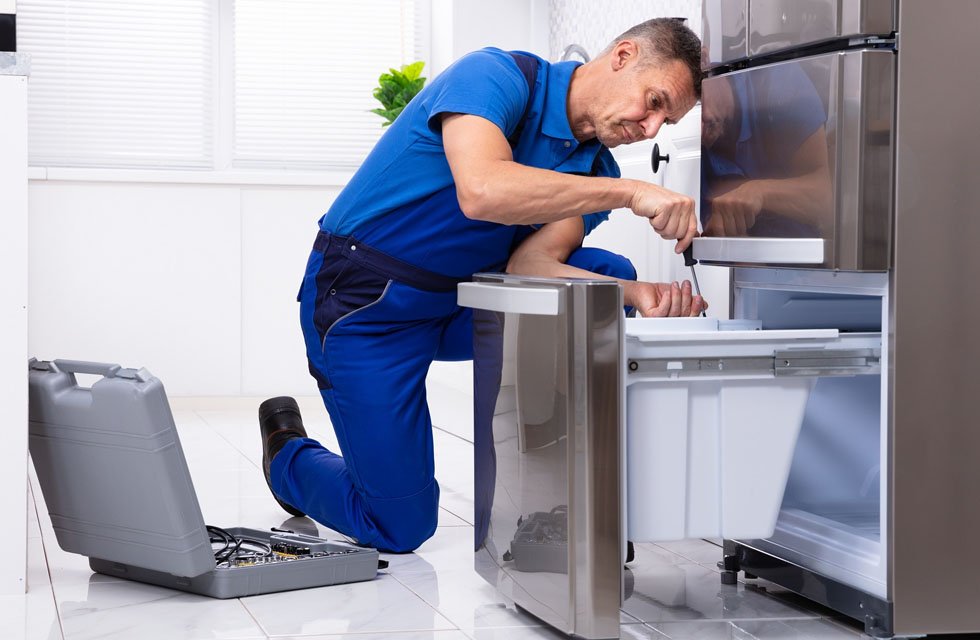There’s nothing quite like the sinking feeling of opening up your fridge and realizing it isn’t cold anymore. Or of watching your washing machine fail to drain with a drum full of soaking wet clothes. Why does this always happen before the big dinner party or when you’re already late for work?
Most homeowners experience a blown appliance every few years, and it’s always only a matter of when, not if. When your appliance meets its maker, however, decisions made in the hours that follow can ensure you’re back in business quickly – or scrambling to manage chaos for weeks.
What’s the First Thing You Should Do?
The first thing you should do? Assess the situation. It may seem like common sense, but a good portion of service calls are prevented by checking simple things – like whether your appliance is plugged into the wall or if a circuit breaker tripped. Assess where the power source is located. Check settings to see if something was inadvertently changed. Has the child lock engaged on the dishwasher? Did someone accidentally switch the dryer to dry on low settings instead of dry on high?
With appliances that hook up to water, be sure that the supply valves are open; they tend to get bumped or switched off during cleaning excursions. If you have an ice maker, check whether that little arm that reaches up to prevent ice creation has been bumped into a 90-degree angle position.
Then, make a note of everything that’s going wrong – diagnosis included. Don’t just jot down “it’s broken.” Note whether it fills with water but doesn’t spin, heats but doesn’t get hot enough, etc.
When You Can Fix Things – and When You Cannot
Of course, it makes sense to undertake some elementary “Do It Yourself” repairs because they genuinely are easy – replacing a blown door gasket; most people can clean a drain pump filter if it gets backed up; many YouTube videos show you how simple these things are (and they’re often cheap).
Yet there comes a point where DIY is not advisable: if you have to get into refrigerant, if you have to engage with gas connections or high-voltage capabilities, don’t do it. If you need special tools or diagnostic readings to attempt a fix, don’t proceed; you may save $150 on a technician coming over but if you end up breaking something worse, you’ve quickly lost that same amount of money in addition to extra parts you now need.
In addition, consider whether your appliance is still under warranty (don’t open your appliance if it will void said warranty) or if it is older than its suggested life span (15 years plus – do repairs make sense?).
Knowing What It’s Going to Cost You
People get taken aback by how much service calls actually cost. Unfortunately, many companies charge a diagnostic fee, meaning they charge an initial service call fee just to diagnose what’s wrong at all. Within $75-150 – and depending on the company and market – you’ll find someone who will give you their professional expertise. Some companies will apply this diagnostic fee should you choose to move forward with repairs.
What they charge for parts and labor after diagnosis depends greatly on what’s broken and what’s required; new heating elements costs about $200 total; compressors can run $600+ means bigger jobs. Many companies charge between $100-$200 per hour and you’d be surprised how long some jobs can take.
In addition, parts availability can come into play – if parts are available for more prevalent brand names and models, chances are they’ll be available same-day or next-day (also meaning; buy good quality brands). If there’s an older model in your midst or something more obscure, it could take one to two weeks for parts to arrive. In the interim, you’re out of luck.
Where You Find Trustworthy Services
Unfortunately, most people don’t know where to start. You need help now! But how do you find someone trustworthy without spending hours on Google or Yelp? Either ask neighbors/friends who they’ve used (reliability in personal referral is trusted over random online reviews) or scour the internet – look for an Appliance Repair in San Antonio company that specializes in your specific brand; those companies will tend to know more about the specific appliances than companies that serve only general populations.
You also want a trusted professional – even if they’re an individual operating out of their truck or a bigger company with multiple technicians and storefronts; make sure they’re licensed and insured. This should be an easy answer – check out online reviews – but also determine how long they’ve been in business; if they’ve been a reputable company for 10+ years, chances are they’re reputable for a reason.
Get it in writing before they come out – in terms of service calls as well as parts/labor – expected payments before they start work – even people who do legitimate work out of their trucks still need to earn money too.
What To Expect When Someone Arrives
A good technician will ask you questions before they start taking apart your appliance; they’ll assess how we got there – was there an odd smell or sound? Is it getting worse over time? This way, they have a little more context compared to standing blind.
They’ll likely start visually before basic testing – a connection here, checking electrical components there – before delving further into specific appliances (temperature readings for refrigerators; cycle tests for washers). Most appliances within the last 15 years have diagnostic modes – computer-generated info like error codes – which gives insight into what bad component has failed.
It’s also okay if they can’t diagnose immediately – sometimes they need parts; sometimes it’s not worth repairing compared to replacement – and a good technician will lay out your options with honesty.
How To Decide Whether To Replace or Repair
This is the hardest part for homeowners because everyone wants to save money as well as their appliances. General rule of thumb: if it’s less than 50% of total replacement cost/new value and it’s been worked hard for over 50% of its intended lifespan, replacement makes sense. But that’s general guidance; if a quality appliance justifies value and has had good history with low stress repair work previously (excluding wear and tear), then it’s worth it.
Conversely, if it’s worked hard in two years after getting cheap on sale during Black Friday – cut your losses. Energy savings also plays a role – a more energy efficient appliance compared to one that’s been running for 20 years in a home can cut energy savings by $100+.
For example, within 10 years’ time that’s actual cash; don’t waste it on electricity bills if you can save from the get-go with newer models.
How To Protect Yourself Going Forward
After you’ve had your appliance repaired or replaced, think about what you can do going forward – for your own peace of mind as well as cost-value assessment. Most appliances last longer if there’s preventative maintenance involved – clean dryer lint traps after each load and vent ducts once a year; wipe down refrigerator door seals, run an empty dishwasher cycle once a month with cleaner.
Document everything when you buy an appliance. Take a photo or video of the model number plate and keep your receipt showing what you paid. This becomes important evidence if you need to file a warranty claim or prove you were using the appliance correctly when something failed.
Extended warranties sometimes make sense, especially for expensive appliances. Here’s a good example: if you bought a high-end refrigerator that costs $3,000 new, and five years down the road you’re facing a $700 repair for parts and labor, that warranty might have paid for itself. The appliance is only halfway through its life, and $700 is less than 25% of replacement cost – but it’s still a chunk of money. For appliances in this price range, the warranty can be worth considering.
Reducing Stress During The Process
Keep things organized and run through them whenever something happens – all appliances will break but it’s not about how stressed out they make you feel: it’s all about having a game plan ahead of time. Which appliances are critical? For the vast majority of families – it would be their refrigerators and washers – hopefully those will be fixed faster than others (and plan for them financially accordingly out of your home maintenance expenses).
Have numbers in your phone/on your fridge; if something breaks at 7 PM on a Sunday before school/work Monday with no groceries in sight – you don’t have time to scramble. Some companies operate emergency contacts/same-day services (though often at additional cost).
Find time in your budget for appliance repairs – and know that setting aside $50-75 monthly helps when these things pop up – but they will pop up because they will break eventually. Appliances are machines and they have moving parts – they’re bound to wear out eventually.
Knowing what to do before any sort of stress materializes helps immensely – assessing what’s possible/reasonable instead of simple fixes helps – even thinking ahead about finding someone trustworthy who has good reputation versus scrambling last minute helps give all homeowners confidence that this is part of the process that everyone goes through regardless.
Nothing’s wrong with appliance trouble – it happens – and knowing how to grasp it before it becomes anything chaotic helps.



